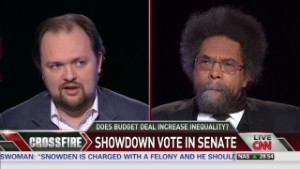Editor's note: LZ Granderson is a CNN contributor who writes a weekly column for CNN.com. The former Hechinger Institute fellow has had his commentary recognized by the Online News Association, the National Association of Black Journalists and the National Lesbian and Gay Journalists Association. He is a senior writer for ESPN as well as a lecturer at Northwestern University. Follow him on Twitter @locs_n_laughs.
(CNN) -- Despite objections from popular Republican Sens. Marco Rubio, Rand Paul and Ted Cruz, it seem the much-criticized budget deal will get final congressional approval this week, sidestepping the cooked-up dramas that have come to define the 113th Congress.
Good news for those of us who like it when politicians actually do their jobs.
Bad news for those who thought the Republican establishment and the tea party were going to live happily ever after.
Last week House Speaker John Boehner let some of his frustrations with the far-right cohort spill out on television. He called them "ridiculous." He said, "They've lost all credibility," and accused them of "pushing our members in places where they don't want to be." He even tossed in a bit of theatrics with his "Are you kidding me?" remark, all of which made for great sound bites.
 LZ Granderson
LZ Granderson Intentionally or not, the outburst also provided a good distraction from the overhaul the Republican National Committee is planning for the 2016 primary process, which was also was reported last week.
RNC Chairman Reince Priebus had talked about limiting the number of debates soon after President Barack Obama was re-elected. Now it seems the RNC is prepared to punish candidates who participate in unofficial GOP debates and forums severely by stripping them of one third of their delegates. Remember the quotes from Republican candidates all trying to out-ultra-conservative each other in 2012? Don't expect to hear as many come 2016. This, more than entertaining sound bites from Boehner, is a far more tangible sign that the establishment is serious about reining in the radical right.
And by radical right, I mean the tea party.
So now what?
Well, 60% of Americans want a third party, and it seems Republicans want their party back. Perhaps it's time that tea party standard bearer Cruz and company file the divorce papers and see if the group has the strength to stand on its own two feet.
 GOP divided over budget deal
GOP divided over budget deal  Boehner, tea party and GOP
Boehner, tea party and GOP  Senator: Budget deal unfair to vets
Senator: Budget deal unfair to vets It is, after all, unlikely that he or any of the other tea party-leaning politicians are going to forgo the group's influence and get in line with moderates just because Boehner said some harsh words on TV. And with deep-pocket groups such as Americans for Prosperity behind the tea party, why should they?
Indeed, many tea partiers believe the reason Republicans lost in 2012 -- despite an economy that lagged under the first Obama administration -- was because Mitt Romney wasn't conservative enough.
This thinking was echoed in November after tea partiers cited a lack of conservatism as a main reason why the anti-gay, anti-abortion Ken Cuccinelli lost in the governor's race in Virginia.
 Cornel West: I would vote for budget deal
Cornel West: I would vote for budget deal Couple that with The New York Times reporting that presumptive front-runner -- and establishment darling -- New Jersey Gov. Chris Christie is as unpopular with ultra-conservatives as he is popular with moderates, and there is no reason to believe the tea party is just going to roll over after Obama signs the budget deal into law.
"(Christie's) no more conservative than Harry Reid," said Scott Hofstra, a tea partier from Vine Grove, Kentucky, told the Times. With statements such as that, it's clear it's time for the GOP and the tea party to call it quits. The two had a good run retaking the House in 2010, but if a guy such as Cuccinelli doesn't pass the conservative smell test and Christie's a RINO, or Republican in Name Only, then it seems this marriage is unsalvageable.
Debates within a party are healthy for Washington. But civil wars are not good for anyone, as evidenced by the country's downgraded credit rating, Congress' historically low approval numbers, the unprecedented number of appointment delays for Obama's nominees and Congress' dubious distinction of being the least productive in U.S. history.
The tea party supposedly started to express the views of voters frustrated with big government. But it has quickly morphed into a thorn in the side of the Republican establishment -- prodding 2012 candidates into making outlandish statements and strong-arming leadership into a series of questionable moves.
It seems it now has a critical decision to make: be reined in or break out. The scenario reminds me of the day Ronald Reagan became a Republican.
It was the summer of 1962. And though he still called himself a Democrat, at this point, Reagan was so in name only. His political leanings had begun shifting in the 1940s, and he had been publicly campaigning for Republicans since the 1950s. One day, while campaigning for Richard Nixon, someone in the crowd interrupted his speech with a question.
Have you registered as a Republican yet?
He replied no.
And then a woman identifying herself as a registrar appeared. She walked down the center aisle, placed a registration card in front of Reagan, and he signed it. He then returned to his speech, later saying, "I didn't leave the Democratic Party, the party left me."
Last week Boehner came down the center aisle and placed a registration card in front of the tea party. But given its beliefs, funding and recent events, is there still a good reason why the group and its followers should sign it?
Follow us @CNNOpinion on Twitter.
Join us at Facebook/CNNOpinion.
{ 0 comments... read them below or add one }
Post a Comment